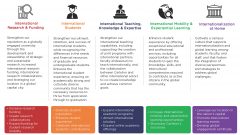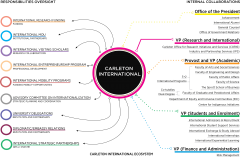Internationalization at Carleton
Carleton University’s International Strategic Plan (ISP) adopts a coordinated approach, celebrates the diversity of international initiatives, and brings together actors across campus. It uses an evidence and data-based approach aimed at facilitating the development of long-term partnerships in line with the institution’s Strategic Integrated Plan as well as other strategies.
The ISP takes into consideration the institution’s progress towards internationalization by focusing on goals that recognize its international outreach; and offers clarity to its decentralized internationalization structure. It aims at enhancing information gathering and sharing, building intercultural and global citizenship capacity, celebrating and promoting mobility and experiential learning, increasing international academic programs, diversifying the international student population and enhancing their unique experience, expanding internationally-funded research projects, and enhancing our international reputation. These aspirations are embedded in our 5 Goals contained in the Plan:
Coordination
The delivery of services and programs related to internationalization involves various stakeholders. The visual below displays how our international activities are dispersed across campus and who is responsible for what activities. Carleton International coordinates and liaises with all actors involved in internationalization, as it delivers key strategic guidance and services to the university at large.
Examples of Internationalization initiatives
Internationalization encompasses a broad scope of highly diverse initiatives. The following examples are a non-exhaustive list of international initiatives associated with Carleton.
Academic
- Academic programs with an international perspective
- Courses that include intercultural skills content
- Cross-cultural training
- Field courses delivered abroad
- International academic consortia
- International academic programs
- International conferences and seminars
- International curriculum development
- Joint or dual degree programs
- Language programs
- Student exchange programs
Research
- Co-publications
- Cotutelle
- Faculty research or teaching mobility
- International research collaboration
- International research consortia
- International research funding
- Joint research projects
- Research exchange programs
International Experiences
- Capacity building
- Faculty and staff mobility
- International development
- International student competitions
- Internships
- Non-academic courses or training
- Student research
- Study tours
- Visiting lecturers and scholars
- Volunteer or service-learning initiatives
Institutional Support
- Funding for mobility
- Immigration advising
- Industry-university partnership (international component)
- Intellectual property
- International and intercultural campus events
- International student recruitments and services
- MOUs and partnerships with international partners
- Professional training
- Scholarship for international experiences
- Teaching trainings that incorporate an international perspective
- Technology transfer
Institutional Culture
- Active support for sustainability, SDGs, global challenges, and multilateralism
- Capacity building expertise and experience
- Diverse services and initiatives that engage international scholars
- Events and services for international students
- Research centres with strong international connections
- Student groups or associations focused on international issues
Advancing Internationalization
Carleton International (CI) is a member of Academics Without Borders, AIEA (Association of International Education Administrators), Calareo (Canada-Latin American Research & Exchange Opportunities) CBIE (Canadian Bureau of International Education), Ontario Universities International, and the Shastri Indo-Canadian Institute. Carleton International works with Mitacs to offer a number of research mobility grants and partners with foreign universities, embassies, ministries of education, university consortia, international education associations, not-for-profit organizations, and Canadian and foreign academic and research funding agencies, among others. These entities are dedicated to the advancement of international cooperation, research cooperation, global challenges, sustainability development goals, intercultural skills development, capacity building, and more.


